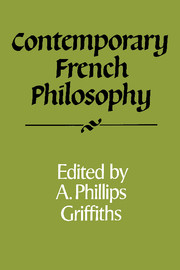Book contents
- Frontmatter
- Contents
- Preface
- Continental Insularity: Contemporary French Analytical Philosophy
- The Misprision of Pragmatics: Conceptions of Language in Contemporary French Philosophy
- Ants and Women, or Philosophy without Borders
- Motifs towards a Poetics
- The Relevance of Cartesianism
- The Enlightenment without the Critique: A Word on Michel Serres' Philosophy
- The Teleological and Deontological Structures of Action: Aristotle and/or Kant?
- The Crisis of the Post-modern Image
- Merleau-Ponty and the Phenomenology of Perception
- Epistemological History: The Legacy of Bachelard and Canguilhem
- History as Genealogy: An Exploration of Foucault's Approach to History
- Beyond Deconstruction?
- Further Adventures of the Dialectic: Merleau-Ponty, Sartre, Althusser
- Paradoxes of the Pineal: From Descartes to Georges Bataille
- Notes on Contributors
- Index
Motifs towards a Poetics
Published online by Cambridge University Press: 25 May 2010
- Frontmatter
- Contents
- Preface
- Continental Insularity: Contemporary French Analytical Philosophy
- The Misprision of Pragmatics: Conceptions of Language in Contemporary French Philosophy
- Ants and Women, or Philosophy without Borders
- Motifs towards a Poetics
- The Relevance of Cartesianism
- The Enlightenment without the Critique: A Word on Michel Serres' Philosophy
- The Teleological and Deontological Structures of Action: Aristotle and/or Kant?
- The Crisis of the Post-modern Image
- Merleau-Ponty and the Phenomenology of Perception
- Epistemological History: The Legacy of Bachelard and Canguilhem
- History as Genealogy: An Exploration of Foucault's Approach to History
- Beyond Deconstruction?
- Further Adventures of the Dialectic: Merleau-Ponty, Sartre, Althusser
- Paradoxes of the Pineal: From Descartes to Georges Bataille
- Notes on Contributors
- Index
Summary
Overture
Contemporary poetry—true to the changes brought about by the poetics of modernity at the turn of the century—far from glorifying the ‘lyrical illusion’ and from favouring ‘romantic’ identifications with heroes standing ‘alone against all’, that madness of a subject believing himself to be the only exception to the law, had in fact to tone down its song, had to pull down its hopes, had to interiorize its failures in order to turn them into paradoxes … What failures? The failures of the poets who thought they were failing. Contemporary poetry has therefore to meditate the different figures of paradoxical failure (the failure that is in no way a simple failure); namely, to distinguish the failures of Baudelaire from that of Rimbaud, from that of Mallarmé…
Poetics, or art thinking about itself, agrees with the Kantian spirit of critique; it makes use of its limitations, turns weakness into strength, uses its reservations as a resource; and it does this on several levels.
First, in the as if thought which ‘reduces’ hope to the hope of inhabiting this world; of finding the way out (the exit) ‘inside’; second, by bringing into play configuration, and, in the case of the poem, by making it use of the rhetorical and rhythmic apparatus of the rapprochement, the bringing together, which configures the appearance (the summons, the appearing together), which emphasizes the difference between the letter and the spirit, between realist naïveté and the ‘promise of happiness’, between time lost and past recaptured: the relationship of the world and its poetic inhabitability, to use Hölderlin's words, that is, the relationship of the world with its figure.
- Type
- Chapter
- Information
- Contemporary French Philosophy , pp. 55 - 68Publisher: Cambridge University PressPrint publication year: 1989

